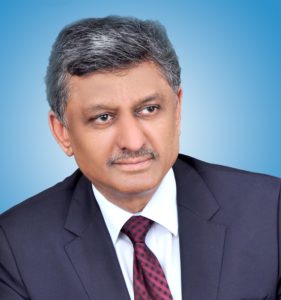
By Mohammad Younus Dagha
“You are not responsible for the past, but insofar as you do nothing, you are complicit in the present created by it.” ― Jonathan R. Miller
When we talk of the turnaround of the Power Sector by presenting the improved figures of recoveries and losses, claiming it as a historicachievement; when such claims are also supported by the experience in a factoryenjoyingzero load shedding after so many years of losing production to long outages and the domestic consumer finding relief of 75% reduction in load shedding from 12-15 hours in the past to 3-4 hours now; the news of Circular Debt again rising to higher levels creates confusion about the performance of the sector and an uncertainty about sustainability of the improvement achieved so far.
Circular Debt was officially defined by the Economic Coordination Committee (ECC) of the Cabinet in 2014, in the following words:
“The Circular Debt is the amount of cash shortfall within the Central Power Purchasing Agency (CPPA), which it cannot pay to power supply companies. The overdue amount is a result of: (a) the difference between the actual cost and the tariff determined by National Electric Power Regulatory Authority (NEPRA) which is the Distribution Company’s loss over and collections under that allowed by NEPRA, (b) the delayed or non-payment of subsidies by government, and (c) delayed determination and notification of tariffs. It is the government’s policy to reduce, limit to a certain amount which would be reduced over time, and eliminate the causes of the circular Debt.” (National Power Tariff and Subsidy Policy guidelines 2014)
In simple words, the issue of Circular Debt is related to cash flows in the power sector, which are affected by the performance of the Distribution Companies (DISCOs) in terms of their collections and line losses as well as the decisions relating to tariff determination by the regulator (NEPRA) and subsidy budgeting.
The Cash flows, needed to run the power generation units,are to be collected from the consumers who can only be charged upto the extent of tariff determined by the Regulator, NEPRA. NEPRA determines eleven different tariffs for consumers of eleven DISCOs, depending on the conditions in each one of them.
The Government changes the determined tariff in two ways: It asks all the DISCOs to charge the lowest of these eleven tariffs, as uniform national tariff, the difference to be paid by government as subsidy. For Example: if the average tariff for all State owned DISCOs isRs. 12 per unit and the minimum determined tariff for a DISCO isRs. 10 per unit, the Federal Government wouldpick up the difference of Rs. 2 per unit as Tariff Differential Subsidy (TDS).
Secondly, in pursuance of its socio-economic objectives, the Federal Government (and in case of agricultural consumers, some provincial governments as well) further reduce this uniform tariff for certain categories of consumers (agricultural, industrial, FATA, Balochistan, AJK) and undertake to pay the difference as subsidies to the distribution companies (DISCOs).

HenceTariff fixing by NEPRA, Subsidies allocation in the budget andPerformance of DISCOs in collections and control of line losses, all contribute to cash flows. The outcome is the sum total of all these which should addup to that much cash which can pay for the cost of generation, transmission and distribution.
NEPRA determines tariff for state owned DISCOs on two main assumptions (apart from others): 100% recoveries and a national average of line losses of 15.3%. Both these assumptions are not based on the ground realities in the country. The average recoveries in the past years (from 2007-2014) had been in the range of 88-89% and the line losses around 19%.
While we can see the impossibility of achieving the target of 100% recovery in Pakistan’s current security and socio-economic conditions, it does not in any way absolve the DISCOs from their responsibility to strive to improve performance towards best possible targets of collections and losses.
Let’s see how the things have changed (or remained the same) in the past two years and how have they contributed to the current surge in the Circular Debt?
In 2014, the difference between NEPRA assumed and actual recoveries and line losses was around 15% (Recoveries 88.6% against NEPRA assumption of 100% and Line losses 19.1% against NEPRA assumed 15.3%).Each percentage point costs Rs. 9-10bn and it was set to contribute roughly Rs. 140 billion to the Circular Debt annually, which would have pushed it from Rs. 298bnin Dec 2014 to Rs. 572bnin Dec2016, but it actually remained atRs. 393 bn on 31st December 2016.
There have been three major elements to this reductionin riseofCircular Debt, which otherwise was inevitable due to deficient tariff:
a) Improved performance byState-owned DISCOs in 2015 and 2016 with unprecedented high recoveriesof more than 93% in 2015 and 2016 consecutively and line losses at all-time low of 17.9%. This reduced the gap of 15% in 2014 between NEPRA assumed and actual recoveries and line losses to 9.2% in 2016. This performance, duly acknowledged internationally, added Rs. 116 bn to the power sector cash flows during the past two years;
b) Lower oil prices, a major portion of which is passed on to the consumers in monthly fuel price adjustments (FPAs), however around 20-25% of it remains in the sector on account of subsidized consumers.
c) Payments of some subsidy arrears by the Federal and Provincial governments.
The allocations for power sector in the budget had been Rs. 430 bn or 1.7% of GDP (2013-14), Rs. 221bn or 0.7% of GDP in 2014-15 and to 118 bnor 0.4% of GDP in 2015-16. The increasing power supplies, with lowering of loadshedding from 12-15 hours in 2013 to now 3-4 hours would require matchingsubsidy budgeting.
What can we conclude from the above discussion? All the three elements of Power Sector cash flows have to be make their contributions for smooth sailing of the sector. The performance by the power companies must sustain the improvements achieved in 2015 and 2016 and further consolidate it; tariff setting by the regulator must be based on ground realities, not on idealistic assumptions; and subsidy budgeting should be according to the quantum of benefits passed on to various consumers by DISCOs under government policies. Unless this happens, the Circular Debt cannot be wished away.
Disclaimer:
The views and opinions expressed in this article/Opinion/Comment are those of the author and do not necessarily reflect the official policy or position of the Dispatch News Desk (DND). Assumptions made within the analysis are not reflective of the position of Dispatch News Desk.





